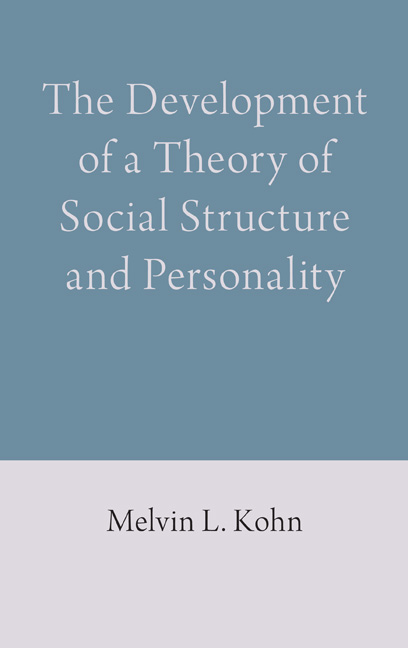Book contents
- Frontmatter
- Contents
- Preface
- 1 Hagerstown and Schizophrenia
- 2 Social Stratification and Parent–Child Relations in Washington, DC
- 3 The Torino Study
- 4 Men Employed in Civilian Occupations in the United States
- 5 The Transformation of the Occupations Study into a Longitudinal Analysis
- 6 Life on Sabbatical Leave in Norway and at the National Institute of Mental Health
- 7 Class, Stratification, and Personality
- 8 Poland under Communism
- 9 Occupational Self-Direction and Distress in Poland
- 10 The Vietnam War, Nixon, and Me
- 11 Japan
- 12 Germany – West and East
- 13 Poland and Ukraine in Transition to Capitalism and Democracy
- 14 The Presidency of the American Sociological Association, Ronald Reagan, and My Job Switch
- 15 My Two Exploratory Expeditions to China
- 16 China in Transition to a Modern Economy
- 17 Retirement, and My Last Sabbatical, at Deep Springs Junior College
- 18 The Theory I Propose
- Index
1 - Hagerstown and Schizophrenia
Published online by Cambridge University Press: 12 July 2019
- Frontmatter
- Contents
- Preface
- 1 Hagerstown and Schizophrenia
- 2 Social Stratification and Parent–Child Relations in Washington, DC
- 3 The Torino Study
- 4 Men Employed in Civilian Occupations in the United States
- 5 The Transformation of the Occupations Study into a Longitudinal Analysis
- 6 Life on Sabbatical Leave in Norway and at the National Institute of Mental Health
- 7 Class, Stratification, and Personality
- 8 Poland under Communism
- 9 Occupational Self-Direction and Distress in Poland
- 10 The Vietnam War, Nixon, and Me
- 11 Japan
- 12 Germany – West and East
- 13 Poland and Ukraine in Transition to Capitalism and Democracy
- 14 The Presidency of the American Sociological Association, Ronald Reagan, and My Job Switch
- 15 My Two Exploratory Expeditions to China
- 16 China in Transition to a Modern Economy
- 17 Retirement, and My Last Sabbatical, at Deep Springs Junior College
- 18 The Theory I Propose
- Index
Summary
I must begin this review of the research I conducted in Hagerstown with an explanation: Here is the story of a spectacularly successful research project conducted under preposterous circumstances. The details may be a bit sketchy (this is a report from decades ago), but the essentials are correct. The events are anything but ordinary. The research was carried out under very strange circumstances. I was hardly qualified to conduct this research. I ran into all sorts of difficulties. And yet the research was extraordinarily fruitful.
Scene: The annual meeting of a House of Representatives committee on drafting a budget for the National Institute of Mental Health (NIMH), probably for Fiscal Year 1953. A member of the committee had the floor, and told the director of the NIMH about a recent, welcome experience. He was in Phoenix, Arizona, on a Saturday afternoon, had run out of worthwhile activities to pursue, and had stopped at the offices of a research field station in that city, not really expecting it to be open. But open it was, and brimming full of activity. The representative was duly impressed that federal employees were at work on a Saturday afternoon and commended the director of the NIMH, after which he invited a request for an increase in funds. The director of the NIMH, a psychiatrist named Robert Felix, a man with a well-deserved reputation for being fast on his feet, responded equivocally that he had shut down that field station. True, the personnel worked hard, but it was supposed to be a research unit, and it wasn't doing any research. He went on to say that he and his colleagues were opening a research field unit in Hagerstown, Maryland. They had recently hired an expert in population studies to conduct research there. Bob Felix won the day. His audience quickly forgot the sad fate of the federal employees in Phoenix, Arizona, and were eager to hear about the plans for Hagerstown, Maryland. What the reader is unlikely to know, but what was well known to the members of the House committee, was that years earlier, Hagerstown had been the place where renowned research had been done by a man named Antonio Ciocco, and the new research unit was certainly being planned to pick up the threads of his work.
- Type
- Chapter
- Information
- Publisher: Anthem PressPrint publication year: 2019



